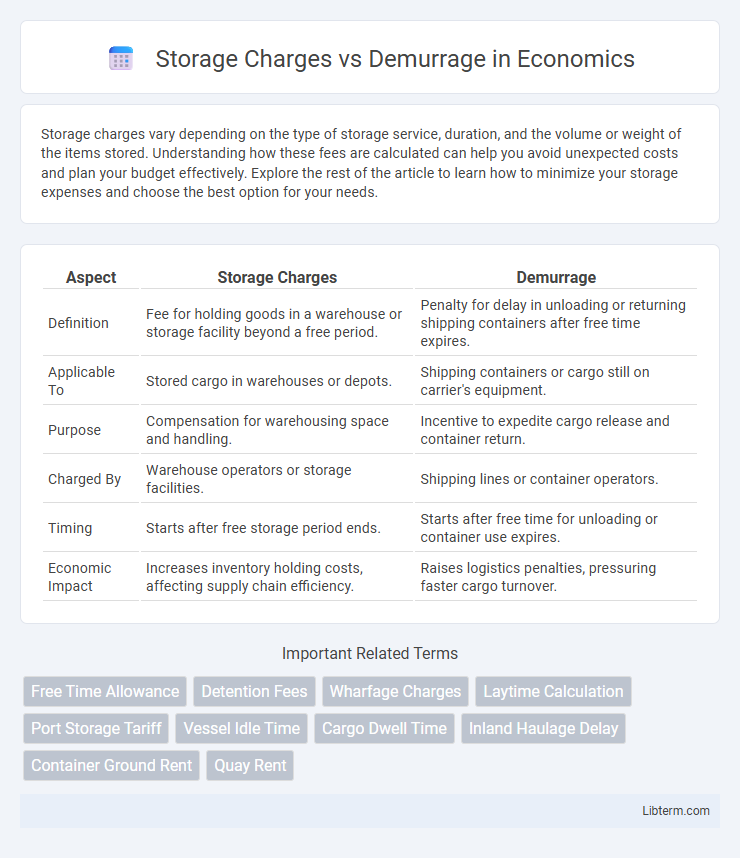Storage charges vary depending on the type of storage service, duration, and the volume or weight of the items stored. Understanding how these fees are calculated can help you avoid unexpected costs and plan your budget effectively. Explore the rest of the article to learn how to minimize your storage expenses and choose the best option for your needs.
Table of Comparison
| Aspect | Storage Charges | Demurrage |
|---|---|---|
| Definition | Fee for holding goods in a warehouse or storage facility beyond a free period. | Penalty for delay in unloading or returning shipping containers after free time expires. |
| Applicable To | Stored cargo in warehouses or depots. | Shipping containers or cargo still on carrier's equipment. |
| Purpose | Compensation for warehousing space and handling. | Incentive to expedite cargo release and container return. |
| Charged By | Warehouse operators or storage facilities. | Shipping lines or container operators. |
| Timing | Starts after free storage period ends. | Starts after free time for unloading or container use expires. |
| Economic Impact | Increases inventory holding costs, affecting supply chain efficiency. | Raises logistics penalties, pressuring faster cargo turnover. |
Understanding Storage Charges
Storage charges refer to fees imposed for keeping containers or cargo on terminal premises beyond the free storage period, calculated based on the duration and volume of goods stored. These charges compensate terminal operators for the use of space and resources required to store goods, encouraging timely pickup. Understanding storage charges is essential for optimizing logistics costs and preventing unexpected expenses in supply chain management.
What Are Demurrage Fees?
Demurrage fees are charges applied when cargo remains at a port or terminal beyond the allotted free time for unloading or pickup, causing delays in container or shipment movement. These fees incentivize timely cargo handling and compensate for the use of port facilities longer than agreed upon. Unlike storage charges, which are typically applied after free time expires for storing goods in a warehouse, demurrage specifically relates to delays in container turnover at shipping terminals.
Key Differences Between Storage Charges and Demurrage
Storage charges apply when cargo remains in a warehouse or container yard beyond the permitted free time, incurring fees based on the duration of storage. Demurrage refers specifically to charges levied on importers or exporters for delays in unloading or loading containers at the port, calculated per day after the free period ends. The key difference lies in their scope: storage charges cover on-site holding costs, while demurrage penalizes the extended use of shipping containers on the terminal.
When Do Storage Charges Apply?
Storage charges apply when cargo remains in a port terminal or warehouse beyond the agreed free storage period, typically after the goods have been unloaded but not yet picked up or moved. These charges are calculated based on the duration the cargo occupies space, measured in days or hours, and vary depending on the facility's policies and the type of cargo stored. Unlike demurrage, which applies to container usage beyond the free time during transportation, storage charges specifically target the warehousing or terminal holding period post-unloading.
Situations Triggering Demurrage Fees
Demurrage fees are triggered when cargo remains at the port or terminal beyond the agreed free time, often due to delays in customs clearance, incomplete documentation, or insufficient transportation arrangements. Storage charges apply while goods are stored, but demurrage specifically penalizes carriers or consignees for extended use of containers or equipment, particularly in import/export shipments. Understanding the time limits set by shipping lines and local regulations is crucial to avoid costly demurrage fees.
Impact on Supply Chain Costs
Storage charges and demurrage both significantly influence supply chain costs by increasing expenses related to delays and inefficient asset utilization. Storage charges accumulate when goods remain in warehouses or terminals beyond the agreed free time, directly raising inventory holding costs and reducing cash flow. Demurrage fees arise from extended use of transportation equipment, such as containers or trucks, leading to higher operational costs and disrupting supply chain schedules.
How to Minimize Storage Charges
Minimizing storage charges requires proactive inventory management and timely cargo retrieval to avoid extended delays at ports or warehouses. Utilizing real-time tracking systems and coordinating closely with shipping lines can help optimize unloading schedules and reduce idle time. Investing in efficient supply chain solutions and negotiating favorable free time periods with carriers also significantly lowers storage-related costs.
Strategies to Avoid Demurrage
Effective strategies to avoid demurrage include optimizing cargo documentation to prevent delays in customs clearance and ensuring timely communication with shipping lines for container release. Implementing precise cargo tracking and forecasting helps manage arrival times, reducing storage periods and associated charges. Coordinating efficient cargo handling with port operators minimizes dwell time, lowering the risk of costly demurrage fees.
Legal Implications of Storage and Demurrage Fees
Storage charges are fees imposed for the prolonged use of storage facilities beyond the agreed free time, while demurrage refers to penalties for delays in container return or cargo release under shipping contracts. Legally, storage charges are governed by warehouse receipts or storage agreements that define liability and duration, with courts enforcing timely payment to avoid lien sales or forfeiture. Demurrage fees arise from contractual shipping terms, and failure to pay can lead to claims for breach of contract, escalating disputes, and potential legal action to recover losses.
Frequently Asked Questions on Storage Charges vs Demurrage
Storage charges are fees applied when cargo remains at a storage facility beyond the free storage period, while demurrage charges are penalties incurred for holding shipping containers beyond the allowed free time at the port. Frequently asked questions often address how to differentiate between storage and demurrage charges, the calculation methods for each, and the duration after which these fees apply. Understanding these distinctions helps importers and exporters manage costs effectively and avoid unexpected expenses during the shipment process.
Storage Charges Infographic

 libterm.com
libterm.com